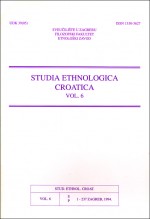Nastojanja da se bačkim Bunjevcima ospori pripadnost hrvatskom narodu
Attempts to Deny the Bunjevci of Bačka the Rights to Belong to the Croat Nation
Author(s): Milana ČernelićContributor(s): Beatrice Mićunović (Translator)
Subject(s): Geography, Regional studies, Cultural Anthropology / Ethnology, Nationalism Studies, Pre-WW I & WW I (1900 -1919), Interwar Period (1920 - 1939), WW II and following years (1940 - 1949), Identity of Collectives
Published by: Sveučilište u Zagrebu, Filozofski fakultet
Keywords: Bunjevci of Bačka; ethnicity; ethnic name; Bunjevac; Šokac; Serbs of Catholic faith;
Summary/Abstract: The introductory part of the article deals with basic data on history and the ethnic structure of the province of Vojvodina, with special emphasis on the immigration of the Croat population in the region of Bačka and the ethnic changes in 20th century in the area. The short account of the basic characteristics of the state of Kingdom of Serbs, Croats and Slovenes (that existed between the two World Wars) provides a perception of the political and social scene in which manipulations with the ethnicity of the Croat group Bunjevci occurred (concerning partly the other Croat group Šokci). The tendency to neutralize Croats started very soon in the new state through the so called "nationalization" of Vojvodina. The term primarily denoted the increase of the Serbian ethnic element in the province, and its aims were covered by the terms such as "Yugoslav", "South Slav", "our people" or "Yugoslav Roman Catholics" for Croats. Under the cover of the common Yugoslav name for three people living in one state, three basic forms of manipulations with the ethnic name of Bunjevci came to light: 1. Neutralization of Bunjevci by emphasizing their distinctiveness: they are neither Serbs nor Croats; one explanation being that they are the fourth tribe of the unique Yugoslav people, and the other one that they are the fourth nation of the Kingdom of Serbs, Croats and Slovenes. 2. Bunjevci can be both Serbs and Croats, which is the matter of individual choice; it is anyway unimportant, because both Serbs and Croats are in fact Yugoslavs. 3. Denial of the Croat ethnicity of Bunjevci, through manipulations with their religious belonging, expressed in claim that Bunjevci as well as Šokci are Serbs of Catholic religion. Manipulations of the kind can be found in different forms in various published sources, especially in the period between 1920 and 1930 and again in 1939 and 1940. The author demonstrates these attempts through quotations from the available and relevant sources. On the basis of the documents the author reaches the conclusion that writings of the kind in the local newspapers reflected the attempts that had been initiated in certain Serbian scientific circles, whose intention was to prove that Bunjevci and Šokci were Serbs who had been converted to Catolicism.
Journal: Studia ethnologica Croatica
- Issue Year: 1994
- Issue No: 6
- Page Range: 85-103
- Page Count: 19
- Language: Croatian

